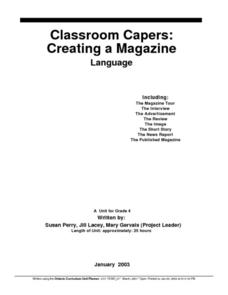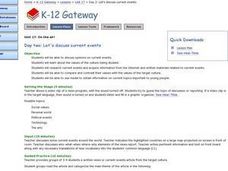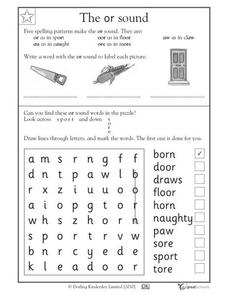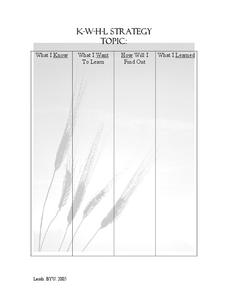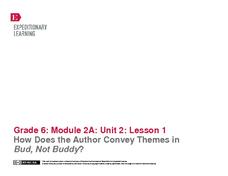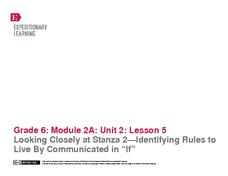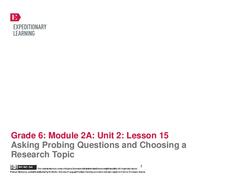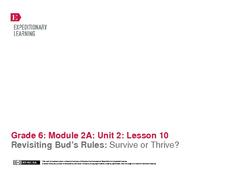Curated OER
Classroom Capers: Creating a Magazine
Fourth graders build language skills in the context of creating a classroom magzine. They participate in activities which help students communitcate ideas and information for a variety of purposes and for specific audiences using the...
Curated OER
First Meeting of the Indians and the Europeans
Your class hears a Native American Indian point of view of Europeans' arrival in Louisiana. They assess how cultural perspectives (especially an insider's view) and native language can shape a story. Each pupil identifies the...
Curated OER
Theater: Create a Script
Figurative language is the focus in the book Teach Us, Amelia Bedelia. After reading Peggy Parish's book, class members dramatize idioms from the text, using dramatic strategies such as characterization, exaggeration, and improvisation....
Curated OER
Hanal Pixan
Students research the culture of Mexico. In this Mexican culture lesson, students view a PowerPoint presentation about the culture of Mexico and the students take notes. Students write an essay about what they have learned.
Curated OER
Pre-Reading Preparation
Students research the English Renaissance era. In this research lesson, students complete this activity before reading the story The Prince and the Pauper to learn about the history. They pick topics and work in groups to research them.
Curated OER
Let's Discuss Current Events
Investigate articles from the daily news and share opinions with classmates. Using current events, learners view a news program without sound and predict what news is being discussed by analyzing the visuals. Then they read news articles...
Curated OER
Letter Sound and Letter Combination Accuracy: Sound Matching Adjectives
Kindergartenrs explore English by analyzing images in a picture book. This lesson on the parts of speech calls for young learners to view a picture book in class and describe characters, settings and objects with adjectives. Then, as a...
Curated OER
HS 204: Introduction to Literature: Poetry Section
This outline introduction for a college course covers the idea of humanities and various language forms and literature genres. Beginning with the human species and our influence on the world around us, take a very thorough look at the...
Curated OER
The or Sound
Before using this vowel sounds crossword activity, be forewarned that the pronunciation here is based on British English, and will be confusing for American English speakers. Learners focus on the /or/ sound, examining five spelling...
Curated OER
Kodomo No Hi: Children's Day Celebration
Children's Day is a beloved Japanese holiday with many colorful and engaging traditions. On this national holiday celebrated yearly on May 5, children are honored for their strengths and given good wishes for happiness. Your younger...
Japan Society
The Bubble Economy and the Lost Decade
Explore Japanese society and national identity. Class members share ideas about the Japanese economy and then investigate a series of resources, including an article, a film, a lecture, and a poem, to learn about Japan's Bubble Economy...
Scholastic
Owl Moon Teaching Plan
Capture the engagement of young readers with this collection of activities based on Jane Yolen's book, Owl Moon. Following a shared reading of this children's story, the class explores the geography of the American Northeast, creates...
Novelinks
Tuesdays with Morrie: K-W-H-L Strategy
Readers of Tuesdays with Morrie are directed to use a K-W-H-L chart to record what they know, what they want to learn, how they will find information, and what they learned about a particular topic related to Mitch Albom's book.
EngageNY
How Does the Author Convey Themes in Bud, Not Buddy?
After reading up to chapter 12 of Bud, Not Buddy by Christopher Paul Curtis, scholars read chapter 13 and take part in a grand conversation about the author's writing techniques. Pupils discuss how his writing conveyed literary themes...
EngageNY
Introducing “If” and Noting Notices and Wonders of the First Stanza
After reading chapter 14 of the story Bud, Not Buddy by Christopher Paul Curtis, scholars take part in a read-aloud of the poem If by Rudyard Kipling and compare it to the reading of Bud, Not Buddy. Learners then go deeper into the poem...
EngageNY
Notices and Wonders of the Second Stanza of “If”
Here is an instructional activity that asks pupils to analyze poetry and sparks discussion about two different types of texts: asking how is the poem, If by Rudyard Kipling alike and different from the story, Bud, Not Buddy by...
EngageNY
Looking Closely at Stanza 2—Identifying Rules to Live By Communicated in “If”
Pupils take part in a close reading of the poem, If by Rudyard Kipling, in which they delve deep into its meaning and identify its rules to live by. As the grand discussion progresses, learners then relate the poem's rules with those...
EngageNY
Notices, Wonders, and Vocabulary of the Third Stanza of “If”
How does one's experience reading a poem's text differ from listening to its audio version? Delve into the insightful question with the poem, If by Rudyard Kipling, as pupils compare and contrast their experience using a note-taking...
EngageNY
Planning for Writing: Introduction and Conclusion of a Literary Argument Essay
After completing three body paragraphs of an argument essay about life's rules to live by from Bud, Not Buddy Christopher Paul Curtis, it's time to begin writing the introduction and conclusion. Independently, pupils draft the final two...
EngageNY
Asking Probing Questions and Choosing a Research Topic
Begin the writing journey of an evidence-based essay detailing a rule to live by with various activities to familiarize learners with the topic and jump-start brainstorming. First, pupils take part in an in-depth review and discussion of...
EngageNY
Introducing Research Folders and Generating a Research Question
Take the next step in the writing process with a lesson plan geared towards the completion of writing an evidence-based essay about a rule to live by, as Bud did in Bud, Not Buddy by Christopher Paul Curtis. Pupils collaborate with their...
EngageNY
End of Unit 2 Assessment: Final Draft of Literary Argument Essay
Take the last step in writing a literary argument essay using Bud, Not Buddy by Christopher Paul Curtis in an activity focused on feedback. Using the stars and steps revision method, pupils consider teacher and peer feedback to revise...
EngageNY
Qualities of a Strong Literary Argument Essay
One activity, two essays, and one central theme: qualities of an argument essay. Here, scholars first describe the qualities of an argument essay regarding Bud's rules to live by from the novel Bud, Not Buddy by Christopher Paul Curtis....
EngageNY
Revisiting Bud’s Rules: Survive or Thrive?
Bud followed a series of rules from Bud, Not Buddy by Christopher Paul Curtis. The question is, how did he use those rules to thrive or survive? After a grand discussion, class members explore the novel to locate and cite textual...


